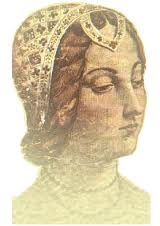The research for my book, The King’s Agent, brought me to Florence. My current research and work in progress have me firmly planted there for what is assuredly a trilogy, perhaps a longer series. So much I encounter everyday takes my breath away, so much makes me long to learn more. The Renaissance (a word based on the Italian word Rinascimento, meaning rebirth) began in the fourteenth century and lasted through to the seventeenth. By then it had spread throughout Europe, but it is undeniable that it began in Italy, in Tuscany and Florence specifically. And while men such as da Vinci, Michelangelo, Bramante, and Raphael perfected the movement, these four men—Francesco Petrarch, Giotto di Bondone, Donato di Niccolò di Betto Bardi (known as Donatello), and Filippo Bruneschelli—began it.
As a writer and self-proclaimed philosopher and spiritualist, it seems only apropos that I begin this series of blog posts with another writer and philosopher, Francesco Petrarch.
Although Dante Alighieri’s work defined the Italian language, it is the literary and philosophical work of Francesco Petrarch (1304-1374) that brought about and encouraged the intellectual enlightenment of the Renaissance via his Humanist writings. The son of exiled nobles, Petrarch was born in Arezzo to Ser Petracco—a merchant who served the State as a notaries public—and Eletta Canigianic. Petrarch was forced to study the law, as his father had, though his interests—his passion—lay in writing and Latin literature. Such passions were all the more antithetical to the life around him as it was a time and place of vast illiteracy.
Africa, Petrarch’s first major work written in spurts over the years of 1337 and 1340, not only cemented his reputation as a model for lyrical poetry but elevated him to the stature of celebrity and awarded him the first crown of a poet laureate of Rome since antiquity. Ironically this work is considered by experts to be influenced by Dante’s Divine Comedy which in turn greatly influenced my book, The King’s Agent. Even in the very first paragraph of the work, a Latin epic recounting the life of the notable Roman General Scipio Africanus, Petrarch’s artistry of language is in magnificent evidence:
"Recount even to me, Muse, the man–famous for his valor and dreadful in war–to whom noble Africa, subdued by Italian arms, first gave her eternal name. Sisters who are my sweet care, if I sing to you of wonders, I pray that it be granted to me to drink again at the fountain of Helicon. Indeed, now Fortune has restored to me the meadows and springs of friendly country, the stillness of uninhabited fields, streams and hills, and the pleasures of sunny forests. You, restore to your bard your songs and inspiration."
Though some may question her true existence, there is strong evidence that the love of Petrarch’s life was one Laura de Noves, a married woman to whom he wrote the Canzoniere, perfecting the sonnet in the doing, a work encompassing 366 poems.
"It was on that day when the sun's ray
was darkened in pity for its Maker,
that I was captured, and did not defend myself,
because your lovely eyes had bound me, Lady."
Having taken vows, finishing his Minor Orders, Petrarch had entered the service of Cardinal Colona. And yet it is believed he fathered two children by a woman or women unknown, Giovanni born in 1337 and Francesca in 1343, both of whom he later legitimized.
For decades, Petrarch traveled, not only to all the major cities of the States of Italy, but to Paris, Flanders, Prague and more. Petrarch traveled and wrote, composing a multitude of poetry and books. So many call him not only the Father of the Renaissance, but the Father of Humanism for he was the first to combine the abstract entities of classical culture with Christian philosophy. Petrarch vehemently argued that God had bequeathed man with enormous intellectual and creative potential, a gift to be used to its fullest. This ‘humanist’ philosophy ignited an intellectual eruption…the study of human thought and action.
During the course of his life, Petrarch lost almost everyone he loved to the plague: father, mother, son, grandson, numerous friends, and even the mysterious Laura. On July 19 of 1374, Petrarch was found dead by his daughter, slumped over his desk, quill in hand, at work on yet another masterpiece. Though buried at his parish church, his remains were later moved by his son-in-law to a sarcophagus built in Arqua. His influence begins with Boccaccio, through countless others, to Shakespeare, and, in the lyricism of his style, to this very humble author.
"I had got this far, and was thinking of what to say next, and as my habit is, I was pricking the paper idly with my pen. And I thought how, between one dip of the pen and the next, time goes on…"




No comments:
Post a Comment